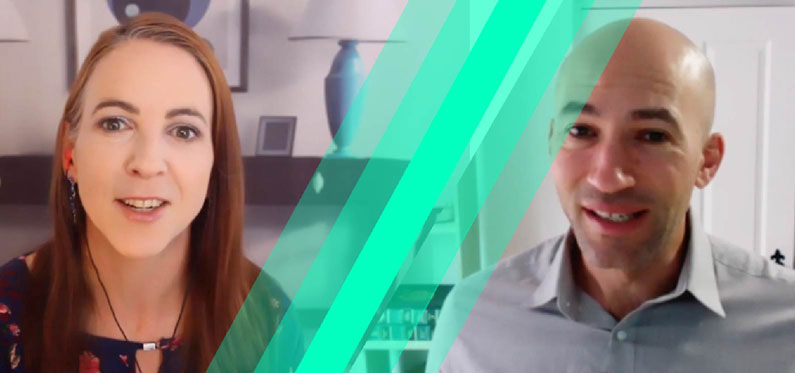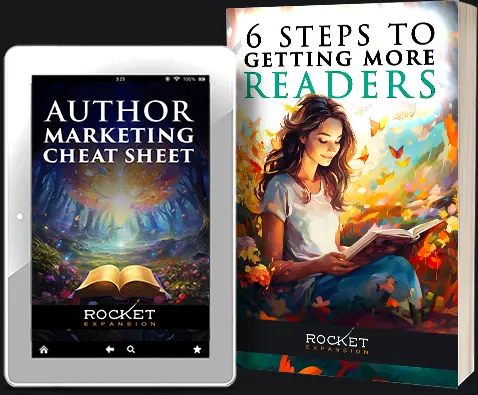How To Create A Winning Author Website And Be Found By Your Audience

My creative agency, GetYourBookIllustrations, specializes in providing authors with high-quality, affordable illustrations.
As a keynote speaker at our conference, Children’s Book Mastery, I interviewed Matthew Ziranek from Rocket Expansion about How to create a winning author website and be found by your audience.
Matt explained how you can create a great website and attract and engage visitors in a way that anyone can understand. Finding a clear, simple explanation with great examples like this is very hard to find, so I wanted his audience to benefit from it too. In this article, I share the highlights of our interview.
We covered the following:
- The key thing to keep in mind with your author website
- Mistakes to avoid with your website
- The one main difference between an “okay” site and a great site
- The key things to include on an author website
- How to create a successful blog and get your website in front of a bigger audience
- How to get visitors to engage with you and your work
At the end, I asked Matt what his top tip would be to help children’s book authors succeed. Make sure you get all the way to the bottom to see his answer!
The Key Factor To Keep In Mind For Your Website
Karen: The first thing I wanted to ask you is what would you say is the key purpose or goal for authors to keep in mind with their website?
Matthew: With an author website, you have a huge opportunity to differentiate yourself from other authors and other people in your genre. So, I think with an author website, you really want to frame the website that shows you as the dark fantasy author or the—if you’re a nonfiction author, you want to be the perfect, I don’t know, specific law specialist in your field. And everything about the website should basically communicate that.
“You really want to frame the website that shows you as the dark fantasy author or the specialist in your field. And everything about the website should basically communicate that.”
Matthew: Let’s say a children’s book author: What kind of children’s book author are you? Do you communicate brilliant moral stories? Then you really want to make sure your website has a feeling, and it’s all about your specific specialty as an author.
Matthew: So, if you come to a website and there’s a little bit of everything, or you’re not 100% sure who this website is for or what this person is about, you’re not really going to hang around too much because you’re probably just going to go, ‘Okay, this is kind of interesting. I don’t know where this is taking me’.
Mathew: Now, on the other hand, if you come to a website and you go, ‘Wow, this is a website about a children’s book author that is interested in telling moral stories to help raise kids well’, and that’s all over the website.
Mathew: That’s very, very specifically themed. The way the website is done, the beautiful little illustrations that have maybe a bit of a spiritual message or something like that. And even the website itself teaches you moral stories about how to do good parenting. The website becomes something super valuable to the person visiting it, because they actually learn something.
Matthew: And then the right target audience is immediately interested, and the wrong target audience immediately goes, ‘Uh, not for me’. So you’ll immediately start building up your audience, because the people that should be finding you will be finding you. So I hope that answers the question.
Karen: Yeah, for sure it does. That’s a good answer.
Mistakes Authors Should Avoid with Their Website
Karen: What would you say are the top mistakes for an author to avoid with their website?
Matthew: I would say going for something sort of cheap and cheerful is a big mistake. Unless you’re actually a professional designer and have a lot of web development skill, the DIY thing is, I think, often a mistake; just because your website will never really get off the ground if you’re trying to sort of bit-and-piece together something with cheap or free software that doesn’t really do that whole ‘I’m the best in my niche’.
Matthew: You want to be the best in your specialist field. And it’s a little bit hard when your website just doesn’t look like it was made by the person who’s the best in their field of making websites, you know? So it’s very hard to look the part when you just simply don’t look the part. So I’d say that’s probably the major error.
Difference Between an ‘Okay’ and a Great Website
Karen: Okay, that makes a lot of sense. What would you say makes the difference between an ‘okay’ website and a great website?
Matthew: I mean, there are many things. That sort of thing I said of just coming across as a specific type of author is very, very important. So I would say basically simple clarity as to who you are and what you do, as opposed to confusion and a little bit of everything.
Matthew: Like I came across a website the other day of somebody who—so he’s a musician. He’s also a writer. He writes books, some books about travel and some books about recruitment. And they’re all on his website. You arrive there and he’s tried to put them all together, but you just don’t know what this guy does and what he’s good at and who he is and where he comes from.
Matthew: The clarity is not there. So I suggested to him to either have very, very different sections on his website, or actually even have three very different websites.
Matthew: So I’d say that’s the biggest mistake: clarity versus confusion. People are online, they want to just get the information fast. They want to understand if this is for them. If not, if it’s not for them, they’re just going to leave instantly. If it is for them, ‘Oh, great’. They’re going to dig more. So you need to be very, very clear.
Karen: Yeah. That makes complete sense. I know when I land on a site, exactly as you said, and it’s like, ‘Oh this person does this and this and this and this’, it just gets confusing. You don’t actually know what you are there for. So that’s good advice to keep it very separate.
Key Things to Include on an Author Website
Karen: What would you say are the most key things for an author to include on their site to get more list sign-ups or sales?
Matthew: Okay, good question. So, you definitely want to make your site a place that people want to come to, explore, enjoy. And you want to make it for your fans. So what do your fans really want?
If you know what your fans like, then include that.
Matthew: Maybe, you want to have a whole lot of awesome things that kids can do, coloring in type of things related to your stories. That would be an awesome fan resource.
Matthew: You definitely want to have a giveaway. So, whether it’s an ebook, whether it’s a fun little movie, it doesn’t really matter that much. What does matter is that it’s completely on theme. It’s to do with your story. It’s in line with what you’re about.
Matthew: And it’s the first step, it’s like that free little offer where you say, ‘Hi, here’s me. This is what I’m about. This is what I can do for you’. And of course, the idea is if they enjoy that, then they’ll go, ‘Well, what else do you have?’
Matthew: With that free offer, you’re also going to trigger an automated series of e-mails. I recommend about 5 to 7 over maybe 2 to 3 weeks. E-mail that says, ‘Hi’, in case you haven’t checked out our free offer, it’s right here waiting for you. Have a look. Here’s something good about it’.
Matthew: And the next one, says, ‘Well, you know, you’ve seen our free offer, but this is much, much, much more amazing then our free offer. Come check this out. You only have to pay a small amount for it’. And you are take them down that little journey to becoming a book buyer.
Matthew: And then you should have all the main things that people expect when they come to a website. You should have an about page, a page for each individual book and a page for each individual series because if somebody is searching for your series name, you want them to find that series page. If someone is searching for a book name, you want them to find that book page.
Matthew: You should obviously have buttons to buy, or buttons that send them to the place where they can buy a book. You should have some way that people can get in contact with you.
Matthew: A blog page I think is quite essential. If you want to get traffic to your website, by far, the easiest and smartest way, in my opinion, is to have a blog and to just develop a ton of content there. There is whole strategy on how you do that in itself. But that is a silly opportunity to be missed.
Karen: Okay, nice, and I think it’s a really good tip as well to have a separate page for each book. And it can make a big difference, as you say, especially with SEO.
Successful Blogging
Karen: So the blog thing, totally understood that that could be a whole interview, probably, but what kind of pointers can you give?
Matthew: So, I’m very much into SEO. I eat, sleep and breathe SEO. I think that you should basically decide, ‘What do I want to write about?’ And you should go and do a bit of keyword research and see what are people wanting to find online. And there’s a very easy, free tool you can use. It’s called Ubersuggest, by Neil Patel. That will give you an idea of what search volumes people are searching for.
Matthew: And then see, ‘Okay, wow, a lot of people are searching for ‘children’s storybooks about the sea’’. So you will then write about everything related to that.
Matthew: In a blog you should not only write about yourself. You should write about what people are interested in. And then you should suggest your own work, and your own answers, as part of the answer.
Matthew: So, like, I’ll give you an example. So, let’s just say ‘stories for toddlers about the sea’. I would find the very best books there are in the world and put your books as position 3, and position 6, and position 10…you know, you’re obviously really proud of your books. And then you say ‘Disclaimer: I’m a little bit biased here, I love my own work. I have included some of my own things’. So the person thinks, ‘Okay, fair enough, you know, you wrote it’.
Matthew: So, I would suggest going on Ubersuggest, seeing what people’s questions are and really figuring out the best way to answer those questions, not just give them whatever you’re about. And then, in those answers, find ways to include your work and what you’re about, as examples and how you are a good answer to these questions.
Matthew: But don’t try and push yourself completely as the answer because two things are going to happen: People that don’t know you aren’t really going to care, and you’re not actually going to get any search traffic from Google, because Google isn’t going to see your answer as relevant.
Matthew: And basically, if they see, ‘sea stories for toddlers’, let’s say there’s this book by, maybe it’s Dr. Seuss, then there’s another one by, Mary ‘Somebody’ here; and these are very, very well-known authors. And Google will immediately know from its big collection of information that this is a relevant article, it’s actually referencing big authors in the children’s storybook world. And it’ll go, ‘Okay, this article could be worth showing, because it’s very relevant’.
Matthew: So, for that reason, it’s important to give real answers that are actually, in the minds of many people, true.
Karen: Yeah, I think that’s a brilliant strategy. I think if someone wants to see a great example of what you just described, I am not going to get the name right, but you have a great article.
Matthew: Yeah. It’s called ‘67 author websites with delicious designs and captivating content’. I think we put two, or maybe three of our websites out of the 67, but all the other ones are designed by other designers, and they’ve done a brilliant job. And it helps us a lot, even though we’re promoting our competition.
Karen: Right. I think that’s the thing, is people might be scared to do that, but actually it has a lot of benefits for you and it doesn’t hurt you. So, that’s kind of key to realize.
Getting Your Website In front of a Bigger Audience
Karen: You kind of explained this now, but are there any other things that authors can do to get their websites in front of their audience more often?
Matthew: Well, there definitely is another very important point I have to go over. So when you’ve got these blog articles that are really high value, excellent answers to those questions on Google. What you then do, you go and network within your niche. Go and find influencers. Actual, real people who have influence within your field, whether it’s publisher blogs or blogs about children’s illustrators and publishers.
Matthew: You find their email address, or you can find them on LinkedIn or Twitter, and you basically say:
- ‘Hi, this is me’
- Something about them that got your interest, that’s real.
- And then you’re introducing your post and why their audience might like it. Maybe, they’d like to share it.
Matthew: The other great thing you could do is, at the bottom, say, ‘Also, I’d love to write a post on your blog’. So using this kind of strategy, you get your content out in front of other people’s audiences who are already much bigger. You get the traffic coming in, because they’ve shared it to a bigger audience. But then over time, every time there’s a link to another website that’s related to yours, it sends a signal to search engines like Google that your website is more important, which we call, in the SEO world, ‘Authority’.
Karen: Nice. Yeah, obviously, as you said, your article has to be really excellent; but, most of these sites, they’re looking for content, too. So, if you have excellent content to offer them, they’re going to be interested, which is key to realize.
Best Blog Articles to Write
Karen: And then, when you do that, do you have any specific pointers for what kind of articles, or what kind of things can you mention that might get you featured, or get more interest from readers for your site.
Matthew: There is pretty much every different type of article you can think of. I mean, there are obvious things like the ‘list post’. The list post is super successful. If you write in a certain genre, or your books are maybe picture books for toddlers, just writing the best 10 or 20 or 50 picture books for toddlers with lots of examples. It’s fairly easy you just basically find them all, find the links to all the websites, make headings for each one, and then fill in one or two paragraphs underneath each one. The list post, you’re definitely going to write a few of those.
Matthew: There’s another type of list post, I’m going to do a list post of, ‘Top Indie authors share their main successful marketing tips for other authors to use to become successful’. And the beautiful thing about that is, it’s called an ‘Expert Roundup’, is you go and you approach a whole lot of people that are already influencers in their field and have already made it.
Matthew: They then give you little quotes, little information. You obviously email them and ask for quotes, if not, sometimes you can just find something on their website and just take that, but whenever possible you actually ask them directly, and then they get involved in the process and they go, ‘Oh, wow, this is great, this is an article about me. This is featuring me as an expert,’ and you’ll probably get some of them that will share your article. And then that article tends to do very, very well, because all the people involved are part of the process themselves. They’ve contributed to the article. So that’s quite a good strategy as well.
Matthew: Other strategies: The ‘how to’ article is always great. Maybe people want to know which ways there are to help your kids get to sleep easily, for example. And maybe you write, literally, a ‘how to’ thing, and in there, ‘Read enough children’s stories’, definitely features, it’s not completely irrelevant.
Matthew: So your ‘how to’ articles that are in some way related to your subject are great opportunities to get more traffic from search and to actually write something that’s valuable to readers. Obviously, you can just write trending story-type articles. If there’s something really big that happened in your industry, in your niche.
Karen: Okay, nice, yeah, that makes a lot of sense.
Getting Visitors to Engage
Karen: What are some other ways that you can really engage visitors to your site and create fans out of them?
Matthew: Marketing should be a process that takes people from awareness—so before people know about you, there’s no awareness of you. It’s a process to take somebody who has no idea who you are and then introduces them to you. Say, ‘Hi, I’m Matthew’, and they go, ‘Oh okay, you’re Matthew’. They don’t know anything else but that, but then you say, ‘I do websites for authors and entrepreneurs’ or whatever you do, right.
Matthew: So then, after they know who you are and a little bit of what you do, maybe they want to know a small sample of what you do. Or maybe you will start talking to them and go, ‘Well, what do you do?’ I mean, you can have an email that asks somebody, ‘Well, what are you interested in about what I do?’ So you get a bit of a dialogue going. But the whole point is you’re not just trying to say, ‘Buy now’, because nobody that knows nothing about you is going to go buy now, especially when you’re starting out.
Matthew: You have a bit of an introduction, you have a bit of a sample of what you’re about. You give it away for free. In exchange for giving that away for free, you can ask for the email address. Then any email software has got a way of sending automated emails once they’ve subscribed. Your first automated email goes off instantly, and it gives them the thing they’ve asked for.
Matthew: So, you know, maybe you give away a free story, and then they get that in the email. You should always send that in the email, because that ensures that they actually gave their real email and subscribed. That’s their first little transaction
Matthew: And then, later on down the chain, you give them more cool stuff. You send them your videos, you send them to your blogs, they start to know who you are. I would highly, highly recommend using video in your strategy if you can. Don’t worry about whether you can speak well or not. I would just speak, and show off your books, and show you’re reading to kids.
Matthew: Once they’re in this email sequence, you just basically send them more and more and more opportunities to know who you are and what you’re about and basically offer your books. And you make enough offers and after a while, one of those offers is just going to hit them.
Matthew: And then, after you’ve taken them down these steps of becoming a buyer, the next thing you want to do, is you want to take them to become a promoter and a sort of a loyal repeat buyer and somebody who will leave reviews. So as part of your sort of thing, later on, you could say to people who have bought: ‘Hey, have you read any of these books? What did you think of them? If you like them, I’d love it that you could leave me a review’. As we all know, the reviews help other people buy.
Top Tip to Help Children’s Book Authors Succeed
Karen: Awesome, that’s a really good overview, thank you. And then what would be your top tip to help children’s book authors succeed?
Matthew: I wouldn’t even say it’s about the website, I would actually say it’s about the illustrations. Your illustrations are probably going to be put on your website anyway. So if you have beautiful, incredible illustrations and they feature on your website, I would say you’re probably going to do okay, because your website’s going to look cool anyway.
Matthew: Don’t sell yourself short on those illustrations. If you’re doing it yourself, make sure you’re actually an illustrator. If you hire somebody, hire the best person you possibly can, that’s really going to make your book shine; because especially for the younger children’s books, the illustrations are really what captivate the kids and actually get them to engage with the story more. Personally I think they are often more important than the story itself. Some of the best children’s stories I know, the success is completely based on the illustrations. And the story was, ‘Yeah, it was okay, but the illustrations made it’, you know. So, I would say if that’s the one tip, it’s not exactly on the subject of websites, but personally I think that’s probably the number one tip for children’s book authors.
Karen: Nice. I’m biased, but I think that’s an awesome tip. Thank you so much, I think that was a really excellent insight for authors to start getting a really good idea of website and SEO and have a really solid foundation on where to go from here.

Want help with your author marketing? Get our FREE ebook and cheat sheet: 6 Steps To Getting More Readers.
By subscribing, you agree to get emails from me, Matt Ziranek. I’ll respect your privacy and you can unsubscribe any time.






